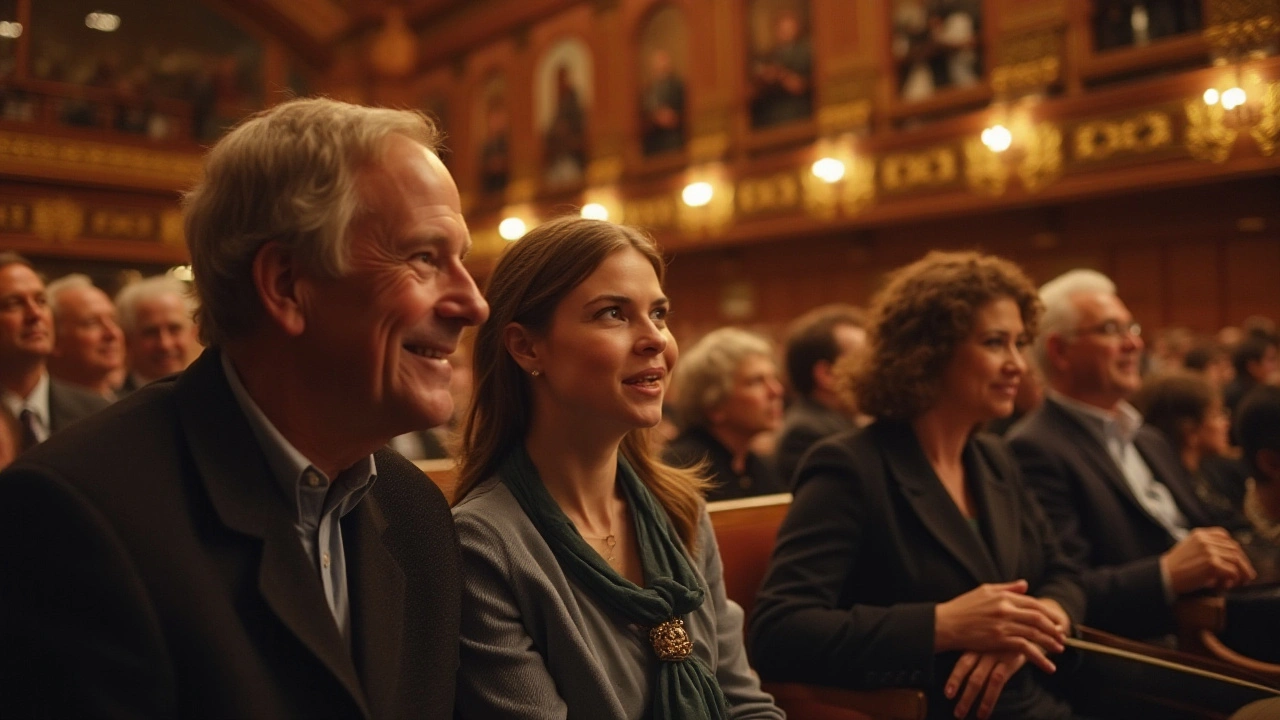People often overlook how powerful classical music can be in shaping their emotional world. Far from being just an art form, classical music has a unique capacity to delve into the depths of the human psyche, bringing out deep-seated feelings and fostering greater emotional intelligence.
For years, scholars and scientists have examined how music impacts our emotional state. What's often underlined is that classical compositions offer not just entertainment, but also a window into understanding both oneself and others on a deeper emotional level.
Whether it’s the soothing tones of a violin, the grandeur of a symphony, or the intricate melodies of a piano, classical music has been shown to have transformative effects. Let's dive into the magic of classical music and discover how it can improve our emotional intelligence.
- The Connection Between Music and Emotions
- Historical Perspectives
- Scientific Insights
- Practical Tips for Engaging with Classical Music
- Real-Life Examples and Benefits
The Connection Between Music and Emotions
Listening to classical music often feels like embarking on an emotional journey. The way music influences our emotions can be traced back to its basic elements: rhythm, melody, harmony, and dynamics. Each of these has the power to evoke feelings ranging from happiness and excitement to sadness and nostalgia.
Studies have shown that our brains respond to music in much the same way they do to other pleasurable stimuli, such as food and sex. This is because listening to music triggers the release of dopamine, a neurotransmitter associated with pleasure and reward. For instance, a study conducted by the Montreal Neurological Institute and Hospital found that dopamine release was 9% higher when participants listened to their favorite music. This increase in dopamine can create feelings of happiness and emotional well-being.
“Music can change the world because it can change people.” – BonoMusic doesn’t just make us feel good; it also helps us understand and process our feelings. When we listen to a sad song, it can evoke empathy by allowing us to feel the artist's emotions, helping us better understand our own. This emotional mirroring is an essential aspect of developing emotional intelligence as it helps us build empathy towards others.
Classical music, with its vast range of emotions and styles, excels at this. Pieces like Beethoven’s Symphony No. 9 or Debussy’s Clair de Lune provide a rich emotional palette. The slow movements often bring a sense of calm and introspection, while the fast movements can instill excitement and energy. This wide range of emotions helps listeners navigate their own emotional landscapes, learning to identify and understand their feelings more deeply.
Research also supports the notion that classical music enhances emotional responses. A study published in the journal 'Nature Neuroscience' showed that participants who listened to classical music experienced more intense emotional responses than those who listened to other genres. This heightened emotional response can improve our ability to manage and express our emotions effectively.
Moreover, the structured yet complex nature of classical music can improve our cognitive abilities. It challenges our brains, promoting better mental functioning and emotional regulation. For instance, the “Mozart Effect,” a term coined from research suggesting that listening to Mozart can temporarily boost spatial-temporal reasoning, indicates that classical music has more than just emotional benefits.
In conclusion, the connection between music and emotions is undeniable. Classical music, in particular, holds a special place in enhancing our emotional intelligence. Whether it’s through the soothing notes of a violin, the bold statements of a symphony, or the intricate melodies of a piano, classical music has the power to transform our emotional world.

Historical Perspectives
Classical music has been an integral part of human culture for centuries, and its influence on emotional intelligence can be traced back to ancient civilizations. The Greeks, for example, believed that music had the power to heal and harmonize the soul. Pythagoras, a renowned philosopher and mathematician, even suggested that certain musical scales could affect a person’s temperament and behavior. This early understanding highlights the long-standing connection between music and emotions.
During the Renaissance, music evolved significantly with composers like Giovanni Pierluigi da Palestrina, whose works were celebrated for their emotional depth and complexity. These compositions were not just for entertainment; they were created with the intent to move listeners' hearts and minds. The intricate counterpoints and harmonies of the period reflected a growing appreciation for how music could mirror the human experience, capturing joy, sorrow, love, and despair in sound.
The Baroque era brought forth geniuses like Johann Sebastian Bach, whose compositions have been described as a dialog between the divine and the human soul. Bach's music often aimed to evoke a spiritual awakening, proving how profoundly music could connect individuals to their inner selves. This period solidified the role of music as a tool for exploring human emotions, laying the groundwork for future composers to build upon.
Fast forward to the Classical period, where figures like Wolfgang Amadeus Mozart and Ludwig van Beethoven revolutionized the emotional range of music. Mozart's operas, symphonies, and chamber works are famously rich in emotional expression, while Beethoven’s groundbreaking use of dynamics and tension created intense emotional experiences. One could argue that Beethoven’s music is a study in human resilience and emotional complexity, tackling themes of struggle and triumph that resonate deeply even today.
The Romantic era took this emotional exploration even further with composers such as Franz Schubert, Pyotr Ilyich Tchaikovsky, and Richard Wagner. The music of this period often aimed to stir the listener’s deepest emotions, with sweeping melodies and elaborate orchestrations. Wagner, in particular, is known for his theory of “Gesamtkunstwerk,” or “total work of art,” where music, drama, and visual elements work together to create an overwhelming emotional impact. This comprehensive approach emphasized music’s power to evoke complex emotional responses.
By the turn of the 20th century, modernist composers like Igor Stravinsky and Arnold Schoenberg began to explore dissonance and atonality, challenging traditional notions of harmony but still aiming for emotional authenticity. Stravinsky's groundbreaking work, “The Rite of Spring,” created shockwaves not only for its musical innovation but also for its raw emotional intensity. His music exemplifies how classical compositions can provoke and challenge, leading to new ways of understanding emotional expression through sound.
Through these historical lenses, it is clear that classical music has long been associated with the exploration and expression of human emotions. Its development over time reflects an ongoing quest to unlock deeper layers of emotional understanding, fostering greater emotional intelligence in listeners. This historical journey underscores the timeless power of music, showcasing its enduring capacity to resonate with the human soul.

Scientific Insights
The realm of classical music has long fascinated scientists and researchers, revealing a tapestry of intricate details about its effects on the human mind and emotions. One intriguing area of study has been how listening to classical compositions activates various parts of the brain, particularly those associated with emotional regulation and empathy.
Researchers have discovered that when we listen to classical music, our brains release dopamine, a neurotransmitter linked to feelings of pleasure and reward. This can create a sense of euphoria or calm, depending on the type of music being played. For instance, slower pieces like Claude Debussy's 'Clair de Lune' can help reduce anxiety and stress, while more grand compositions like Beethoven's symphonies can invigorate and energize listeners.
According to Dr. Daniel Levitin, a neuroscientist and author of the book 'This Is Your Brain on Music': "Listening to music can be an emotionally transformative experience, acting almost like a reset button for your brain."
Moreover, scientific studies have shown that playing or listening to classical music can significantly improve one's emotional intelligence. EEG scans reveal that musicians and avid listeners of classical compositions often have more developed regions of the brain linked to emotional processing. For example, the temporal lobe, which is crucial for memory and understanding language, is more active and developed in those who engage with classical music regularly.
Beyond mental health, these developments can lead to better interpersonal relationships. Music encourages empathy by helping individuals understand and connect with emotions that they might not have experienced directly. This is particularly true for pieces that convey a narrative or evoke strong imagery, such as Tchaikovsky’s 'Swan Lake' or Vivaldi’s 'Four Seasons.'
Furthermore, there is evidence suggesting that classical music can enhance cognitive functions. A study published in the journal 'Nature' indicated that students who listened to Mozart before taking a test scored higher than their peers who did not. This “Mozart Effect” has been replicated in various forms, showing that exposure to classical music can sharpen focus and improve memory retention.
Interestingly, not all classical music impacts everyone the same way. Individual differences, such as personal history with music and emotional resilience, play a significant role in how we perceive and are affected by music. Thus, while some people might find solace in Brahms, others might find joy in Bach. The key is to engage with pieces that resonate personally and emotionally.
To delve deeper, consider the work being done in music therapy. This therapeutic approach uses music to address emotional and psychological issues, proving especially effective in situations where conventional methods may fall short. Therapists often use classical pieces to help patients tap into suppressed emotions and develop healthier coping mechanisms.
Overall, the scientific community agrees: classical music is not merely a form of entertainment. It's a critical tool for enhancing emotional intelligence, fostering empathy, and improving mental health. Whether through brain scans, psychological studies, or personal anecdotes, the evidence is clear—engaging with classical compositions can significantly enrich our emotional lives.

Real-Life Examples and Benefits
Imagine starting your day with a cup of coffee and the gentle notes of Bach's “Air on the G String” playing in the background. People who regularly listen to classical music often find themselves becoming more attuned to their emotions and the emotions of those around them. It’s not just anecdotal; there’s substantial evidence backing this up. For instance, teachers have started incorporating classical music into their classrooms to help children develop empathy and better emotional regulation.
One fascinating study conducted by the University of Helsinki discovered that classical music not only enhances mood but also increases gene activity related to brain function. The researchers noted that listening to classical music can activate genes involved in dopamine secretion and transport, synaptic function, and learning. This means that when students or professionals listen to classical music, they often find it easier to concentrate and manage their emotions.
The renowned cellist Yo-Yo Ma once said, “Music has the power to make us more human, to connect us to each other and the wider world.”
Let’s look at some everyday examples. In hospitals, classical music is often played to help patients relax and reduce stress levels. This isn't just about making the environment more pleasant. Studies have shown that patients who listen to classical music require less pain medication and experience quicker recovery times. The relaxing tones of Mozart or Vivaldi can lower heart rates and reduce blood pressure, contributing to overall health and wellness.
Parents are also using classical music to their advantage. Playing soothing compositions for infants has been shown to improve their sleep patterns and even boost their cognitive development. This phenomenon, often referred to as the “Mozart effect,” suggests that early exposure to classical music can enhance a child’s brainpower, helping them to perform better in school and social settings as they grow older.
In the workplace, companies are beginning to recognize the benefits of background classical music for their employees. It's not uncommon to find offices where Chopin or Debussy plays softly in the background, and the employees report feeling less stressed and more productive. Classical music can create an atmosphere of calm and focus, allowing workers to tackle projects with renewed energy and a clear mind.
Benefits for Mental Health
One of the most compelling benefits of classical music is its positive impact on mental health. Individuals suffering from anxiety and depression often find relief through regular listening sessions. The complexity and beauty of classical compositions can provide an emotional outlet, helping listeners process their feelings and attain peace of mind. Studies have shown that playing an instrument or simply listening to classical music can elevate one's mood, reduce symptoms of depression, and even improve sleep quality.In therapy settings, music therapists use classical music to help clients explore and modify their emotions. Patients dealing with trauma, grief, or chronic pain find solace in the structured yet expressive nature of classical music. Therapists often encourage clients to select pieces that resonate with them, creating personalized soundtracks that aid in their emotional and psychological healing.
Classical Music: A Tool for Emotional Development
| Benefit | Description |
|---|---|
| Enhanced Concentration | Listening to classical music helps improve focus and productivity. |
| Stress Reduction | Calming compositions reduce anxiety and lower stress levels. |
| Mental Health | Offers relief from symptoms of depression and anxiety. |
| Emotional Awareness | Helps listeners become more attuned to their emotions and those of others. |
Classical music isn't just an art form; it's a bridge to higher emotional awareness and intelligence. As we incorporate classical music into our daily lives, whether in the classroom, hospital, home, or workplace, we unlock the potential to enhance our emotional well-being, empathy, and overall quality of life.

